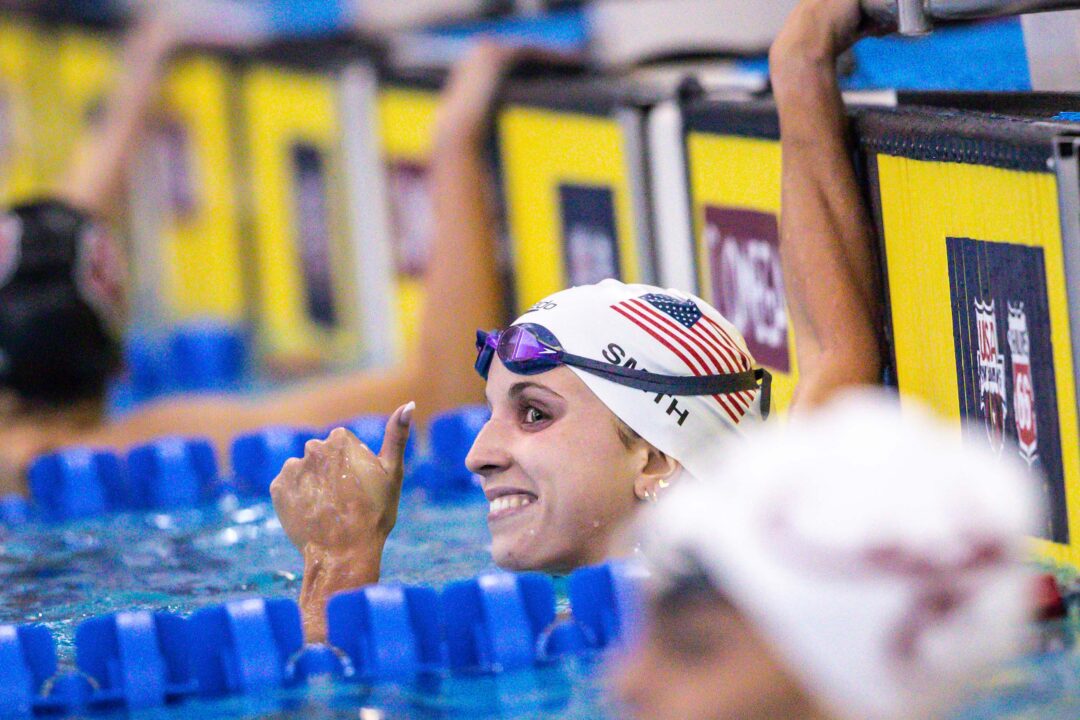This article originally appeared in the 2022 Spring edition of SwimSwam Magazine. Subscribe here.
The 2022 FINA World Aquatics Championships is set to happen from June 18– July 3, in Budapest. This is an extraordinary championship. The 2021 World Championships, originally scheduled to take place in Fukuoka, Japan, was postponed until 2022 due to the Olympics being pushed back. Then, by the beginning of February, FINA announced that the competition was being pushed back from May 2022 until July 2023 because of COVID-19 restrictions put in place in Japan.
In fact, the Fukuoka World Championships is actually set to happen. Organizing a World Championships in Budapest has been a way for FINA to provide a world-level long course meet in 2022.
Since 2001, there have been World Aquatics Championships held in the years right after the Olympics. Analyzing the history, what could we expect from the 2022 Worlds?
Coincidentally, the last post-Olympics World Championships was also held in Budapest in 2017 — and we witnessed very fast times back then. For example, Simone Manuel won the bronze medal in the women’s 50 freestyle in 23.97 — 0.10 faster than the winner of the Olympic gold medal in Rio, one year before.
In the men’s 100 butterfly, Mehdy Metella placed eighth in the final in 51.16. At the Rio Olympics, the silver medal was won in 51.14. In the women’s 200 backstroke, Regan Smith placed eighth in 2:07.42. She would have won the Olympic bronze medal in 2016.
Very fast events. But was the same pattern observed in the entire meet? How fast are the post-Olympics World Championships? In this analysis, the 26 individual events have been compared (2000 Olympics x 2001 Worlds, 2004 Olympics x 2005 Worlds, and so on). The 2008 Olympics and the 2009 Worlds have not been taken into account because of the distortion caused by the high-tech suits.
The following table shows the improvement percentage observed in the World Championships compared to the Olympics held in the previous year in terms of the winning time, the bronze medal time, and the time to make the final.
Percentage of events faster at World Championships compared to previous Olympic Games
| Edition | Gold | Bronze | Final |
| Budapest 2017 | 57.69% | 46.15% | 38.46% |
| Barcelona 2013 | 30.77% | 30.77% | 19.23% |
| Montreal 2005 | 61.54% | 23.08% | 42.31% |
| Fukuoka 2001 | 23.08% | 23.08% | 26.92% |
In 15 events (57.69%), the winning times from the 2017 World Championships were faster than the winning times from the 2016 Olympics, just one event less than 2005 x 2004. In 12 events (46.15%), it took faster times in 2017 than in 2016 to make the podium. In terms of making the final, it was 10 events.
We see figures below 50% in almost every entry in the table, which means that, overall, the Olympics tend to be faster than the World Championships held one year after.
So that’s what we should expect from the 2022 World Championships, especially considering that some countries will have a very busy schedule, with the European Championships and the Commonwealth Games being held July–August.
We should surely expect very fast times in Budapest. But history says that, overall, the Olympic Games are faster than the post-Olympic World Championships.
Just out of curiosity, we can conduct a similar analysis, this time comparing the times from the Olympics with the last World Championships up to that date, in order to evaluate how fast the Olympics were. Again, because of the suits, the 2008 Olympics were left out of this analysis.
Percentage of events faster at Olympic Games compared with the previous World Championships
| Edition | Gold | Bronze | Final |
| Tokyo 2021 | 53.57% | 60.71% | 82.14% |
| Rio 2016 | 76.92% | 80.77% | 88.46% |
| London 2012 | 84.62% | 80.77% | 80.77% |
| Athens 2004 | 50.00% | 84.62% | 80.77% |
As we can see, in terms of winning the gold medal and making the podium, the 2021 Olympics were not as fast as previous Olympics. Of course, the COVID-19 pandemic may have had a pivotal effect. And yet, in terms of making the final, in more than 80% of the individual events, we saw faster times in Tokyo than in Gwangju 2019.
Since the overall gold and bronze medal winning times in Tokyo were not as fast as we would expect by this analysis, the Budapest World Championships can benefit from it in terms of times improvement. The athletes will be only two years from the 2024 Olympics, which means 2022 certainly won’t be an off year. Many of them set very fast times during the 2021 short course season, including several world records. The biggest stars in Tokyo, like Emma McKeon, Caeleb Dressel, Ariarne Titmus, Adam Peaty, Katie Ledecky, Kaylee McKeown, Kristof Milak and others, are in heavy training.
Maybe we will see a big improvement percentage this time in Budapest. The athletes would love to do it.
